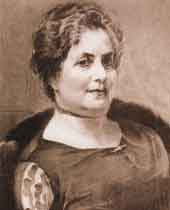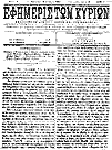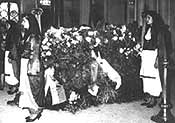| Kalliroi
Siganou-Parren was born in Platania in the Amari valley in 1859 into a
wealthy family. After the rebellion in 1866 and the destruction of Arkadi
Monastery the family fled to Athens, where Kalliroi started her school
attendance at the Soumerli School. After this she continued at The French
School, and in 1878 she graduated from the Arsakeio
School with full
marks. |

|
|
The
very same year she was taken on at the Greek School of Educational Studies
in Adrianoupoli (the
present Edirne
in Turkey),
but was by the Greek Society in Odessa asked to lead the girls' school of
the town. Here Kalliroi taught for two years, until she returned to Athens
to marry Jean
Parrén, a journalist who founded the Athenian news agency of which he was
the leader for many years.
|
|
|
|

|
Kalliroi Parren
was the first in Greece to introduce the feminist principles, which had
already shown up about Europe. As she thought that she could not archieve
her purpose through scattered articles in already existing newspapers, she
founded her own weekly "Women's Newspaper", which she edited
until 1918 when she was exiled to the island of Hydra because of her
political view. Kalliroi Parren thought that the liberation of women
should be done through enlightenment, and therefore the newspaper carried
educational, financial, philological and artistic articles and moreover
biographies of famous women and descriptions of how other countries solved
the feminist problems.
|
| The
first issue was edited on March 8th 1887 and was almost
snapped up, as 7.000 copies were sold in a few hours in a capital of then
65.000 inhabitants. Understandably she
was met by a strong opposition from the editors of other newspapers, who
attacked her in every possible way and called her "the anarchist".
|
| Kalliroi
Parren also participated in many
international
women's conferences, which
inspired her to found various organizations, such as the "Union for
Liberation of Women" which she founded in 1896. Before that she had
already founded the "Agia Aikaterini Home" (1875) and the "Sunday
School for Necessitous Women and Girls of the People" (1880), where
women with a certain education taught other women reading, writing and
elementary arithmetic. In 1896 she founded "Greek
Women's Union", which had branches for education and housework
and one for war widows and orphans.
|
| In
1911 she founded the still working "Lykeio
ton Ellinidon" (Upper Secondary School for Greek Women) with its
declared aim to liberate women through systematic education. The school
has later opened branches all over Greece and tries to preserve and
promote the local traditions (customs, clothing, folk dancing, songs,
handicraft etc.). The school received a prize from Academy of Athens in
1939 for its great work, and furthermore it won first prize at the third
festival of folk dancing in Mallorca in 1989.
|

|
| Kalliroi
Parren tried to influence the politicians to give women the right to study
at the higher educational establishments. She achieved her purpose in
1895, when the first female student was enrolled as medical student at the
university. Unfortunately the student was exposed to harassments in
such a degree that she committed suicide.
|
Students
from "Lykeio ton Ellinidon"
at Kazantzakis' coffin
in the Agios
Minas Church in 1957
|
|
| This
tragic event caused Parren to carry on her work for recognition of women's
rights. She now demanded votes for women. This did not however become a
fact until 1925, and only for women of more than 30 years, who were able
to read and write.
|
| In
the meantime she had achieved (1900) a reduction of working hours in
dressmakers workrooms, prohibition of night work and protection of
children.
|
| Kalliroi
Parren also tried to influence society through literature. With her novel
"Cheirafetimeni" (Liberated) from 1900 she contributed to the
development of the social novel in Greece. Her second book "I magissa"
(The Witch Woman) from 1901 was a sequel to the first, and the Greek poet
Kostis Palamas characterised it as a "courageous and adult social
novel".
|
| When
Kalliroi Siganou-Parren died in January 1940, she could look back on an
active life within the liberation of women.
|
|

|
|
|
Bust of
Kalliroi Parren
in Platania |
|



